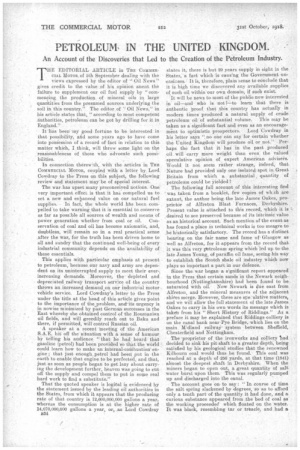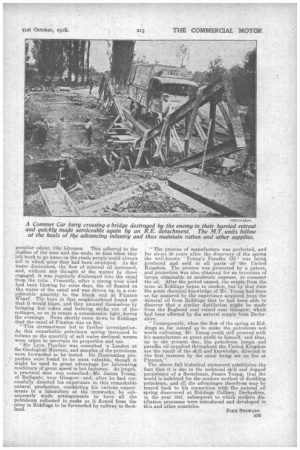PETROLEUM , IN THE UNITED KINGDOM.
Page 14

Page 15

If you've noticed an error in this article please click here to report it so we can fix it.
An Account of the Discoveries that Led to the Creation of the Petroleum Industry.
THE EDITORIAL ARTICLE in THE COMMERCIAL MOTOR, of 5th September dealing with the views expressed by the editor of "Oil News" gives credit to the value of his, opinion anent the failure to supplement our oil fuel supply by " commencing the production of mineral oils in large quantities from the presumed sources Underlying the soil in this country," The editor of " Oil News," in his article states that, "according to most competent authorities, petroleum can be got by drilling for it in England."
It has been my good fortune to be interested in that possibility, aid some years ago to have come into possession of a record of fact in relation to this matter which, I think, will throw some light on the reasonableness of those who advocate such possibilities.
In connection therewith, with the articles in THE COMMERCIAL MOTOR, coupled with a letter by Lord Cowdray to the Press on this subject, the following review and statement may 'be of special interest.
The war has upset many preconceived notions. One very 'important effect, is that it has compelled us to set a new and enhanced value on our natural fuel supplies. In fact, the whole world has been cornpelled'to take warning that it is essential to conserve as far as possible all sources of wealth and means of power generation whether from coal or oil. Conservation of coal and oil has become axiomatic, and, doubtless, will remain so in a real practical sense after the war, for the truth has been driven home to all and sundry that the continued well-being of every industrial community depends on the availability of these essentials.
This applies with particular emphasis at present to petroleum, because our navy and army are dependent on its uninterrupted supply to meet their ever-, increasing demands. Moreover, the depleted and depreciated railway transport service of the country throws an increased demand on our industrial motor vehicle service. Lord Cowdray's letter to the Press under the title at the head of this article gives point to the importance of the problem, and its urgency is in nowise minimized by past German successes in the East whereby she obtained control of the Roumanian oil fields, and will greedily reach out to Baku and there, if permitted, will control Russian oil.
A speaker at a recent -meeting of the American S.A.E. hit' off the situation with a sense of humour by telling his audience "that he had heard that gasoline (petrol) had been provided so that the wokld could learn how to make an internal-coinbustion engine ' • that just enough _petrol had been put in the earth to enable that engine to be perfected, and that, just as soon as people began to get lazy about carrying the development further, heaven was going to cut off the supply and compel them to put in soine real hard work to find a substitute."
That the quoted speaker is logical is evidenced by the statement issued by the leading oil authorities in the States, from which it appears that the producing rate of that country is 12,600,000,000 gallons a year, whereas the consumption is at the higher rate of 14,070,000,000 gallons a, year, or, as Lord Cowdray 534 states it, there is but 29 years supply in sight in the States, a fact which is causing the Government 'uneasiness. It is, therefore, plain sense to conclude that it is high time we discovered any available .supplies of such oil within our own domain, if such exist. 'It will be news to most of the. public now interested in oil—and who is not I—to learn that there is authentic Proof that this country has actually in modern times produced a natural supply of crude petroleum oil of substantial volume. This may be taken as a significant fact and even as an encouragement to optimistic prospectors. Lord 'Cpw.dray in his letter says ', no one can say for certain whether the United Kingdom will produce oil or not." Perhaps the fact that it has in the past produced oil will 'carry more 'weight than even the valued speculative opinion of expert American advisers. Would it not seem rather strange, indeed, that Nature had provided only one isolated spot in Great Britain from which a substantial_ quantity of petroleum could be yielded? The following full account,of this interesting find was taken from a booklet, few copies of wh:ch are extant, the author being the late James Oakes, proprietor of Alfreton Blast Furnaces, Derbyshire. Present value is attached to this record, which it is . desired to see preserved because of its intrinsic value as an historical account. Such mention of the event as has found a place in technical works is too meagre to ,be historically satisfactory. The record has a distinct bearing on the fair name and fame of' Glasgow as well as Alfreton, for it appears from the record that it was this very petroleum spring which led up to the late James Young, of paraffin oil fame, seeinglis way to establish the Scotch shale oil industry which now plaYs so important a part incur defence.
Since the war began a significant report appeared in the Press that certain sands in the Newark neighbourhood (Nottinghamshire) had been found to be saturated with oil. Now Newark is clue east from Alfreton, and the mineral measures of the adjacent shires merge. However, these are spelulative matters, and w'e will allow the full statement of the late James Oakes to carry in his own words its message which is taken from his "Short History of Riddings." As a preface it may be explained that Riddings colliery is on the canal bank near Pye Bridge, which lies on the main Midland railwaY system between Sheffield, Chesterfield and Nottingham.
The 'proprietor of the ironworks and colliery ta,c1 decided to sink his pit shaft to a greater depth, being satisfied by his geological studies that the renowned Kilbourn coal would thus be found.This coal was reached at a depth of -250 yards, at that time (1841) almost the deepest shah in Derbyshire. When the miners began to open out, a great quantity of salt water burst upon them. This was regularly pumped up and discharged into the canal.
The account goes on to say : "In course of time the salt spring slackened by degrees, so as to afford only a tenth part of the quantity it had done, and a curious substance appeared from the bed of coal as the working proceeded which floated on the water. It was black, resembling tar or treacle, and had a
peculiar odour, like bitumen. This adhered to the clothes of the men and the tools, so that when they left work to go home on the roads people could always tell in which mine they had been employed. As She water diminished, the flow of mineral oil increased, and, without any thought of the matter by thore engaged, it was regularly discharged into the canal from the tubs. Presently, after a strong west wind had been blowing for some days. the oil floated on the water of the canal and was driven up in a considerable quantity to the blank end at Pinxton Wharf. The boys in that neighbourhood found out that it would blaze, and they amused themselves by bringing hot cokes and burning sticks out of thecottages, so as to create a considerable light„during the evenings. News shortly came down to Riddings that the canal of Pinxton was on fire.
"This circumstance led to further investigation. As this remarkable petroleum spring increased in volume as the quantity of salt water declined, means were taken to ascertain its properties and use. "Sir Lyon Playfair was consulted in London at the Geological Museum, and samples of the petroleum were forwarded to be tested. Its illuminating properties were found to be most valuable, though it might be used to great advantage for lubricating machinery of great speed in hot factories. At length, a practical man was consulted—Mr. James Young, of Bathgate, near Glasgow—and, after he had SUOcessfully directed his experience to this remarkable natural production, conducting his various experiments in a laboratory at the ironworks, he subsequently made arrangements to have all the petroleum collected in casks as it flowed from the mine in Riddings to be forwarded by railway to Scotland.
"The process of manufacture was perfected, and for about 20 years after the discovery of the spring the well-known 'Young's Paraffin Oil' was being produced and sold in all parts of the United Kingdom. The process was protected by a patent, and protection was also obtained for an invention of lamps obtainable at moderate expense, to consume the oil. After the period named, the supply from the mine at Riddings began to slacken, hut by that time the great chemical knowledge of Mr. Young had been so far matured by the experience acquired from the mineral oil from Riddings that he had been able to discover that a similar distillation might be made from the Boghead coal raised near Glasgow, which had been affected by the natural supply froni Derbyshire.
"Consequently, when the flow of the spring at Riddings so far ceased as to make the petroleum not worth collecting, Mr. Young could still proceed with his manufacture at great profit to himself, and thus, up to the present day, the petroleum lamps and paraffin oil supplied throughout the United Kingdom are the result of the skill and knowledge, directed in the first instance by the canal being set on fire at Pinxton."
The above full historical statement establishes the fact that it is due to the technical skill and dogged persistence of a Scotchman, James Young, that the world is indebted for the modern method Of distilling petroleum, and all the advantages therefrom may be traced back to lirs connection with the natural oil spring discovered at Riddings Colliery, Derbyshire, in the year 1841, subsequent to which modern distillation processes were introduced and developed in this and other countries.
70}IN STEWART. B35






















